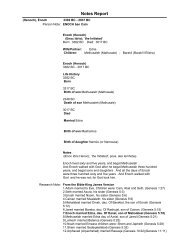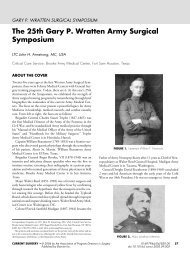- Page 1 and 2: Descendants of Darius I Great Gener
- Page 3 and 4: Generation 3 (con't) provincial aut
- Page 5 and 6: Generation 4 (con't) Darius Ochus a
- Page 7 and 8: Generation 6 (con't) Makrokheir, Xe
- Page 9 and 10: Notes for Artabazus I Setrap: Gener
- Page 11 and 12: Generation 10 (con't) In the same y
- Page 13 and 14: Generation 11 (con't) ii. PHILA II
- Page 15 and 16: Generation 12 (con't) v. CLEOPATRA
- Page 17 and 18: Generation 15 27. ANTHIOCHUS I 12 S
- Page 19 and 20: Generation 17 (con't) Arab Republic
- Page 21 and 22: Generation 20 (con't) 38. SELEUCUS
- Page 23 and 24: Generation 21 (con't) 47. i. SANVOR
- Page 25 and 26: Notes for Laodice I DeSyrie: Laodic
- Page 27 and 28: Generation 25 (con't) Antiochus II
- Page 29 and 30: Generation 28 (con't) 55. i. LNOR 2
- Page 31 and 32: Generation 28 (con't) (The Yngling
- Page 33 and 34: what is surprising is a pervert god
- Page 35 and 36: Generation 29 (con't) In chapter 14
- Page 37 and 38: Generation 29 (con't) Njord Swedes
- Page 39 and 40: allowed by their law; and their chi
- Page 41 and 42: Generation 30 (con't) Explanatory N
- Page 43: Generation 31 (con't) " In Historia
- Page 47 and 48: Njörðr's name appears in various
- Page 49 and 50: For Freyr and Niord have endowed Ge
- Page 51 and 52: 31. ^ Hollander (2007:135). Generat
- Page 53 and 54: Generation 32 (con't) " Ynglinga sa
- Page 55 and 56: Rällinge in Lunda parish in the pr
- Page 57 and 58: Notes for Vanlandi Svegdasson: Vanl
- Page 59 and 60: Uppsala he bought two giantesses, G
- Page 61 and 62: Yngvi Frey 30 , Njord 29 Swedes, Yn
- Page 63 and 64: Generation 35 (con't) a mansion on
- Page 65 and 66: Generation 35 (con't) The even earl
- Page 67 and 68: Generation 36 (con't) Historia Norw
- Page 69 and 70: Turkey, Vengor of 24 Turkey, Altoy
- Page 71 and 72: Generation 37 (con't) Dygve's mothe
- Page 73 and 74: Generation 38 (con't) The even earl
- Page 75 and 76: Generation 38 (con't) " Ynglinga sa
- Page 77 and 78: Generation 39 (con't) " Ynglinga sa
- Page 79 and 80: Generation 39 (con't) AD in Uppsula
- Page 81 and 82: Alrek and Eirík (Old Norse Alrekr
- Page 83 and 84: Generation 40 (con't) 3. ^ Laing's
- Page 85 and 86: Generation 41 (con't) Northvegr.org
- Page 87 and 88: Generation 41 (con't) Yngvi Alrekss
- Page 89 and 90: Generation 42 (con't) AD in Uppsula
- Page 91 and 92: Generation 43 (con't) 83. ALREK 40
- Page 93 and 94: Generation 43 (con't) Haldanus (Hal
- Page 95 and 96:
Generation 43 (con't) 5. ^ Storm, G
- Page 97 and 98:
Generation 44 (con't) " Ynglinga sa
- Page 99 and 100:
If there is any authenticity behind
- Page 101 and 102:
To tell the gallant hero's death.[3
- Page 103 and 104:
When Ohthere and his actions are co
- Page 105 and 106:
Notes for Aun Jorundsson: Aun Wikip
- Page 107 and 108:
Generation 46 (con't) Anglo-Saxon f
- Page 109 and 110:
Skjöldunga saga The Skjöldunga sa
- Page 111 and 112:
Generation 46 (con't) Hrólfr Kraki
- Page 113 and 114:
Generation 46 (con't) 16. ^ Ekrem,
- Page 115 and 116:
In Ari Þorgilsson's Íslendingabó
- Page 117 and 118:
Generation 47 (con't) married Mrs O
- Page 119 and 120:
to get back to Sweden. Around the G
- Page 121 and 122:
Sktobius Of 25 Turkey, Vengor of 24
- Page 123 and 124:
Name Generation 49 (con't) The Nors
- Page 125 and 126:
As can be seen it agrees with the e
- Page 127 and 128:
Generation 49 (con't) Andøya. Aði
- Page 129 and 130:
Generation 49 (con't) 13. ^ The Yng
- Page 131 and 132:
Generation 49 (con't) The Historia
- Page 133 and 134:
Generation 50 (con't) Secondary sou
- Page 135 and 136:
With fiery feet devouring flame Gen
- Page 137 and 138:
" Historia Norwegiae Generation 51
- Page 139 and 140:
Daskyleion, Pharnaces 7 Dascylium,
- Page 141 and 142:
Generation 52 (con't) written in th
- Page 143 and 144:
Generation 53 (con't) Högne the Ge
- Page 145 and 146:
Generation 53 (con't) iv. ALFARIN A
- Page 147 and 148:
Wikipedia: Halfdan the Mild Generat
- Page 149 and 150:
Generation 55 (con't) When Alfhild
- Page 151 and 152:
Generation 56 (con't) AD in Of, Ork
- Page 153 and 154:
Generation 57 (con't) Fragmentary A
- Page 155 and 156:
Generation 58 (con't) 113. IVAR 55
- Page 157 and 158:
Generation 58 (con't) 6. Weis, Fred
- Page 159 and 160:
Generation 60 (con't) Sagas The sag
- Page 161 and 162:
Generation 60 (con't) " Smyth, Alfr
- Page 163 and 164:
Generation 60 (con't) ii. EMMA OF N
- Page 165 and 166:
Generation 61 (con't) Theos, Anthio
- Page 167 and 168:
Generation 62 (con't) Apame Amastri
- Page 169 and 170:
Generation 62 (con't) Note: In term
- Page 171 and 172:
Generation 62 (con't) PONTHIEU) was
- Page 173 and 174:
Generation 62 (con't) Normandy and
- Page 175 and 176:
o Matilda4 Generation 63 (con't) o
- Page 177 and 178:
Generation 63 (con't) Apame Amastri
- Page 179 and 180:
Against the wishes of Pope Leo IX,
- Page 181 and 182:
For William I, the worst crisis cam
- Page 183 and 184:
youngest son Henry received 5,000 s
- Page 185 and 186:
Generation 63 (con't) [edit] Depict
- Page 187 and 188:
Generation 63 (con't) readers, but
- Page 189 and 190:
Generation 63 (con't) xxix. WILLIAM
- Page 191 and 192:
Generation 64 (con't) ix. ADELAIS (
- Page 193 and 194:
the old English royal house. He mad
- Page 195 and 196:
Henry was also known for some bruta
- Page 197 and 198:
[G. E. Cokayne, in his Complete Pee
- Page 199 and 200:
Henry I Chronology Generation 64 (c
- Page 201 and 202:
Generation 64 (con't) xxx. SIBYL EL
- Page 203 and 204:
father was duc d'Normandie in far G
- Page 205 and 206:
Generation 65 (con't) Publication:
- Page 207 and 208:
Generation 65 (con't) Calvados, Fra
- Page 209 and 210:
Generation 65 (con't) Herefordshire
- Page 211 and 212:
then 15. He was also Count of Maine
- Page 213 and 214:
21. Ogive of Luxembourg 5. Matilda
- Page 215 and 216:
Generation 66 (con't) Ingvarsson KI
- Page 217 and 218:
The castle of William, Château Gui
- Page 219 and 220:
the Norman guards stationed outside
- Page 221 and 222:
are poor agricultural lands, and ar
- Page 223 and 224:
Geoffrey of Conversano. Generation
- Page 225 and 226:
Generation 66 (con't) William I of
- Page 227 and 228:
Generation 66 (con't) xxvi. WILLIAM
- Page 229 and 230:
Generation 66 (con't) He is also kn
- Page 231 and 232:
Generation 66 (con't) fleet was 36
- Page 233 and 234:
shouted in anger but possibly not w
- Page 235 and 236:
[edit] Fictional portrayals Henry i
- Page 237 and 238:
Generation 66 (con't) Aquitaine) wa
- Page 239 and 240:
Selby, Yorkshire Died 1 December 11
- Page 241 and 242:
In 1113, Henry attempted to reduce
- Page 243 and 244:
[edit] With Ansfride Generation 67
- Page 245 and 246:
Generation 67 (con't) 2.^ Green, Ju
- Page 247 and 248:
Generation 67 (con't) xxiv. ELIZABE
- Page 249 and 250:
This article is about the King of E
- Page 251 and 252:
the rightful heir. Arthur fought hi
- Page 253 and 254:
Nottinghamshire's border with that
- Page 255 and 256:
22. Malcolm III of Scotland 11. Mat
- Page 257 and 258:
[edit] References Generation 67 (co
- Page 259 and 260:
Generation 67 (con't) xxvi. RICHARD
- Page 261 and 262:
her husband, Geoffrey -and campaign
- Page 263 and 264:
Graham Shelby, The Villains of the
- Page 265 and 266:
Generation 68 (con't) Jorundsson, J
- Page 267 and 268:
Generation 68 (con't) Henry's reign
- Page 269 and 270:
His favourite wine was made with Ge
- Page 271 and 272:
Generation 68 (con't) xii. NICHOLAS
- Page 273 and 274:
Richard I of England Generation 69
- Page 275 and 276:
ich lands as a vassal from Louis VI
- Page 277 and 278:
all, clergy and laity alike. At Cla
- Page 279 and 280:
30. Edward the Exile 15. Margaret o
- Page 281 and 282:
Generation 69 (con't) vi. WILLIAM E
- Page 283 and 284:
Notes for Edward I "Longshanks" Kin
- Page 285 and 286:
Almain, and John de Warenne, Earl G
- Page 287 and 288:
coronation of King Richard I, in 11
- Page 289 and 290:
Alexander's daughter Margaret and G
- Page 291 and 292:
Generation 69 (con't) preparing for
- Page 293 and 294:
Generation 70 (con't) 156. i. ROGER
- Page 295 and 296:
Humbert. King Henry promised his Ge
- Page 297 and 298:
to the Crown in 1213.[8] The Pope,
- Page 299 and 300:
Geoffrey FitzRoy, who went on exped
- Page 301 and 302:
Generation 70 (con't) King John app
- Page 303 and 304:
Generation 70 (con't) xvii. KING LL
- Page 305 and 306:
Generation 70 (con't) 155. EDWARD I
- Page 307 and 308:
Generation 70 (con't) On 25 January
- Page 309 and 310:
Edward had been challenged by John
- Page 311 and 312:
and her General. Mortimer responded
- Page 313 and 314:
List of unusual deaths [edit] Refer
- Page 315 and 316:
Generation 71 (con't) 160. i. ROBER
- Page 317 and 318:
leader of those who wanted to reass
- Page 319 and 320:
Generation 71 (con't) Henry has bee
- Page 321 and 322:
Generation 71 (con't) xvi. WILLIAM
- Page 323 and 324:
Generation 71 (con't) King of Engla
- Page 325 and 326:
the county of Ponthieu. Instead of
- Page 327 and 328:
peasant mobility by asserting that
- Page 329 and 330:
Generation 71 (con't) "Edward III a
- Page 331 and 332:
Generation 72 (con't) 164. i. ROBER
- Page 333 and 334:
Edward was born at the Palace of Ge
- Page 335 and 336:
Mongol invasion and the attack on G
- Page 337 and 338:
Peter of Aragon, in what has become
- Page 339 and 340:
Generation 72 (con't) property of a
- Page 341 and 342:
Generation 72 (con't) died on 21 Se
- Page 343 and 344:
Generation 72 (con't) Generation 73
- Page 345 and 346:
Caernarfon Castle, Gwynedd Died 21
- Page 347 and 348:
Gaveston was considered to be athle
- Page 349 and 350:
unhappiness. Edward's half-brother,
- Page 351 and 352:
Edward II's tomb at Gloucester Cath
- Page 353 and 354:
Generation 73 (con't) Weidenfeld an
- Page 355 and 356:
Serle, a former esquire of Richard
- Page 357 and 358:
Generation 73 (con't) Leger and Mar
- Page 359 and 360:
Ingjaldsson, Ingjald the wicked Bra
- Page 361 and 362:
Intending to regain what the Englis
- Page 363 and 364:
at home. The problems came to a Gen
- Page 365 and 366:
Generation 74 (con't) Yet the exten
- Page 367 and 368:
Generation 74 (con't) DeClifford, R
- Page 369 and 370:
Generation 75 (con't) Dyggvasson, D
- Page 371 and 372:
Generation 75 (con't) Notes for Ann
- Page 373 and 374:
Generation 75 (con't) x. MARY PLANT
- Page 375 and 376:
saw an opportunity to regain royal
- Page 377 and 378:
Generation 76 (con't) ii. LEWIS DE
- Page 379 and 380:
Generation 76 (con't) v. MARY TUDOR
- Page 381 and 382:
Generation 77 (con't) viii. ELIZABE
- Page 383 and 384:
Generation 78 (con't) Halfdan 54 Ey
- Page 385 and 386:
Generation 78 (con't) vi. RICHARD P
- Page 387 and 388:
Generation 78 (con't) HOWARD. He wa
- Page 389 and 390:
Generation 79 (con't) vii. ELIZABET
- Page 391 and 392:
Generation 80 (con't) He married El
- Page 393 and 394:
Generation 80 (con't) Apame Amastri
- Page 395 and 396:
Copenhagen, returned to Scotland Ge
- Page 397 and 398:
[edit] King and Parliament Generati
- Page 399 and 400:
Generation 80 (con't) had presided
- Page 401 and 402:
Generation 81 (con't) 200. i. ROBER
- Page 403 and 404:
Generation 81 (con't) Conqueror" Ki
- Page 405 and 406:
Frederick's father-in-law, James VI
- Page 407 and 408:
Generation 81 (con't) the Peace of
- Page 409 and 410:
Emmanuel I, Duke of Savoy, and the
- Page 411 and 412:
Linz, Upper Austria, Maximilian, Du
- Page 413 and 414:
The winter palace constructed for F
- Page 415 and 416:
[edit] External links Generation 81
- Page 417 and 418:
Generation 82 (con't) Duke Of 60 No
- Page 419 and 420:
the works of René Descartes and Ge
- Page 421 and 422:
Generation 82 (con't) Ernest had a
- Page 423 and 424:
A recent biography, Wicked Ernest,
- Page 425 and 426:
Generation 82 (con't) Wittelsbach)
- Page 427 and 428:
the religious beliefs of most of th
- Page 429 and 430:
[edit] Early reign in England Gener
- Page 431 and 432:
immediately renounced the treaty, G
- Page 433 and 434:
Generation 83 (con't) James I Stuar
- Page 435 and 436:
Generation 83 (con't) George was bo
- Page 437 and 438:
pro-French, writing out some of the
- Page 439 and 440:
even government officials above the
- Page 441 and 442:
Generation 83 (con't) Notes for Sop
- Page 443 and 444:
Generation 84 (con't) Eystein1 47 A
- Page 445 and 446:
Generation 84 (con't) 7.Ludwig (21
- Page 447 and 448:
Generation 84 (con't) before the ce
- Page 449 and 450:
throne. This formally severed all t
- Page 451 and 452:
issued an ultimatum calling on Fred
- Page 453 and 454:
manuscripts), was presented as a Ge
- Page 455 and 456:
Generation 84 (con't) [edit] Family
- Page 457 and 458:
Generation 84 (con't) Thomas Camp a
- Page 459 and 460:
Generation 84 (con't) was crowned a
- Page 461 and 462:
Generation 84 (con't) Americans wou
- Page 463 and 464:
Generation 84 (con't) Caroline Bran
- Page 465 and 466:
Generation 85 (con't) Philopator of
- Page 467 and 468:
Generation 85 (con't) Although cons
- Page 469 and 470:
opposed the marriage, even though G
- Page 471 and 472:
Generation 85 (con't) One decision
- Page 473 and 474:
Generation 85 (con't) collection of
- Page 475 and 476:
xxxii . xxxii i. xxxi v. xxxv . xxx
- Page 477 and 478:
Generation 85 (con't) Altenburg) wa
- Page 479 and 480:
lands of the Duke of Brunswick-Lün
- Page 481 and 482:
Generation 86 (con't) In 1706, the
- Page 483 and 484:
Generation 86 (con't) Townshend was
- Page 485 and 486:
arranged marriage of state, instiga
- Page 487 and 488:
Generation 86 (con't) Sanvoritcus o
- Page 489 and 490:
Generation 86 (con't) Notes for Geo
- Page 491 and 492:
Generation 86 (con't) James's Park,
- Page 493 and 494:
Generation 87 (con't) Halfdansson,
- Page 495 and 496:
succeed to his Austrian dominions.
- Page 497 and 498:
As King George I of Great Britain h
- Page 499 and 500:
Generation 87 (con't) viii. DOROTHY
- Page 501 and 502:
Generation 87 (con't) of 20 Syria,
- Page 503 and 504:
Generation 88 (con't) Richard Starl
- Page 505 and 506:
Generation 88 (con't) xxi. ADAM CAM
- Page 507 and 508:
Generation 88 (con't) Princess Augu
- Page 509 and 510:
Generation 88 (con't) 242. vii. ABN
- Page 511 and 512:
Generation 88 (con't) v. LOUISE OF
- Page 513 and 514:
Generation 89 (con't) xviii. ELIZAB
- Page 515 and 516:
Generation 89 (con't) showing him,
- Page 517 and 518:
Generation 89 (con't) ii. CLEVIA HE
- Page 519 and 520:
Generation 89 (con't) On the death
- Page 521 and 522:
Generation 90 (con't) xvi. MARGARET
- Page 523 and 524:
Generation 90 (con't) iii. CHARLES
- Page 525 and 526:
Generation 90 (con't) 237. GEORGE V
- Page 527 and 528:
Generation 91 (con't) on 21 Feb 183
- Page 529 and 530:
Generation 91 (con't) 243. i. EDWAR
- Page 531 and 532:
Generation 91 (con't) Sandringham H
- Page 533 and 534:
Generation 92 (con't) iv. LAWSON DE
- Page 535 and 536:
Generation 92 (con't) Edward VII of
- Page 537 and 538:
Generation 92 (con't) born on 01 De
- Page 539 and 540:
Generation 92 (con't) Living Windso
- Page 541 and 542:
Generation 93 (con't) Plantagenet,
- Page 543 and 544:
Generation 93 (con't) 253. CHARLES
- Page 545 and 546:
Generation 94 (con't) Notes for Geo
- Page 547 and 548:
Generation 95 (con't) Ingjaldsson,
- Page 549 and 550:
Generation 95 (con't) Living Windso
- Page 551:
Generation 96 (con't) ii. WALES WIL





